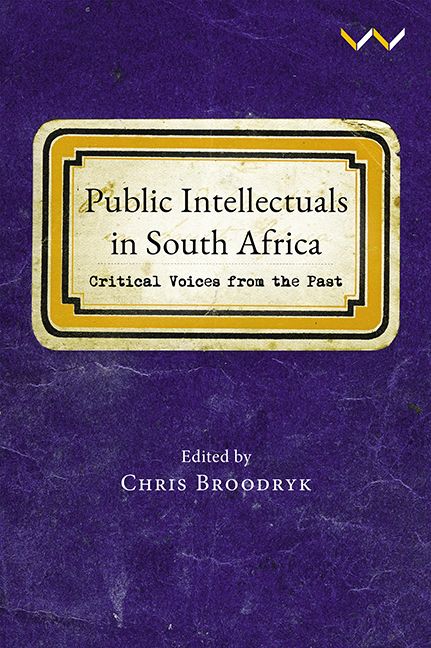Book contents
- Frontmatter
- Contents
- Acknowledgements
- Introduction: The Prismatic Nature of Public Intellectualism
- Chapter 1 Recalibrating the Deep History of Intellectual Thought in the KwaZulu-Natal Region
- Chapter 2 Elijah Makiwane and Early Black South African Public Intellectualism
- Chapter 3 Black Art Criticism in The Bantu World during the 1930s
- Chapter 4 In Conversation with the Nation: Sowetan’s Maverick Editor Aggrey Klaaste
- Chapter 5 William Pretorius and the Public Intellectualism of the Film Critic
- Chapter 6 Cultural Policy and the Arts: Mewa Ramgobin and Public Dialogue
- Chapter 7 ‘Kaalgat Critique’: The Public Intellectualism of Koos Roets as Afrikaans Satirist
- Chapter 8 The Public Intellectualism of Artivist Mandisi Sindo
- Chapter 9 The Janus-Faced Public Intellectual: Dr Thomas Duncan Greenlees at the Institute for Imbecile Children, 1895–1907
- Index
Chapter 7 - ‘Kaalgat Critique’: The Public Intellectualism of KoosRoets as Afrikaans Satirist
Published online by Cambridge University Press: 16 July 2022
- Frontmatter
- Contents
- Acknowledgements
- Introduction: The Prismatic Nature of Public Intellectualism
- Chapter 1 Recalibrating the Deep History of Intellectual Thought in the KwaZulu-Natal Region
- Chapter 2 Elijah Makiwane and Early Black South African Public Intellectualism
- Chapter 3 Black Art Criticism in The Bantu World during the 1930s
- Chapter 4 In Conversation with the Nation: Sowetan’s Maverick Editor Aggrey Klaaste
- Chapter 5 William Pretorius and the Public Intellectualism of the Film Critic
- Chapter 6 Cultural Policy and the Arts: Mewa Ramgobin and Public Dialogue
- Chapter 7 ‘Kaalgat Critique’: The Public Intellectualism of Koos Roets as Afrikaans Satirist
- Chapter 8 The Public Intellectualism of Artivist Mandisi Sindo
- Chapter 9 The Janus-Faced Public Intellectual: Dr Thomas Duncan Greenlees at the Institute for Imbecile Children, 1895–1907
- Index
Summary
[An] uncomfortable presence … who brings disruption and conflict… that is what intellectuals are for.
— Tony Judt (cited in Posner 2003)Public intellectuals have long used and engaged with the arts to communicateideas about power, identity and society John Issit and Duncan Jacksondiscuss the difficulty of trying to determine the role of a publicintellectual: ‘I am looking for what the public intellectual mightbe, what it might become, its tensions, its changes, its history, its rolesand its ideological condition.’ They are quite clear that confiningthe term ‘public intellectual’ to its Oxford Dictionarydescription of ‘an intellectual who expresses views intended to ageneral audience’ is a narrow definition, ‘which lacksexplanatory precision on the one hand’ and is ‘excessivelyrestrictive in scope on the other’. In propagating a less restrictiveuse of the term ‘public intellectual’, I argue that two filmsdirected by Koos Roets can be considered a form of ‘symbolicgoods’ that disrupted the status quo within the Afrikanercommunity.
Roets is not known as a critically engaging media presence, or for writingthought-provoking criticism in newspaper columns (like many of the otherpublic intellectuals discussed in this book). However, as a cinematographerhe made immense contributions to films by dissident film-makers JansRautenbach and Emil Nofal that would change the course of the South Africanfilm industry. The films he collaborated on as a writer, cinematographer anddirector received attention from scholars, critics and general filmaudiences. In considering these films, I posit with other scholars that theterm ‘public intellectual’ could be broadened to includeverbal or published goods that make a contribution to otherindividuals’ thinking. Therefore, I propose it is not Roets'spublic persona that deserves to be credited with being a publicintellectual; rather, it is that his films are symbolic goods that havecontributed to the public sphere, as well as the history of South Africanfilm.
To construct this argument, I refer to two feature films Roets directed:Die GroenFaktor (The Green Factor, 1984) and Kaalgat tussendie Daisies (Naked among the daisies, 1997). These films werecreated and released 13 years apart and I read them as demonstratingRoets's approach within two different socio-historical contexts.
- Type
- Chapter
- Information
- Public Intellectuals in South AfricaCritical Voices from the Past, pp. 158 - 178Publisher: Wits University PressPrint publication year: 2021



